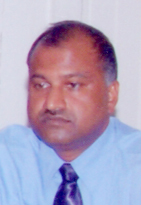-crime chief
Although allegations of torture have stalled police investigations into the murder of Ramenauth Bisram, Crime Chief Seelall Persaud says there is still hope.

Bisram, a former vice-chairman of the Essequibo Islands/West Demerara region was discovered dead in his home on October 26. There were several stab wounds about his body including his abdomen and face. Bisram’s brother-in-law, Walter, found his naked body surrounded by pools of blood in his bedroom, with a blood-stained kitchen knife next to it.
The Crime Chief, during an interview with Stabroek News on Friday, said police were currently hunting “one other” perpetrator in connection with Bisram’s murder.
A 15-year-old, who made headlines after police allegedly torched his genitals; Deonarine Rafick and Nouravie Wilfred were initially taken into custody for Bisram’s murder. Rafick was later charged with the murder and during his court appearance he alleged he had been tortured. In court, he displayed signs of a beating and had a gaping wound in his head which required stitches. It was later discovered that the teen had been burned in the genital area and he was subsequently hospitalised. Wilfred, meanwhile, was released without charge after a week in custody.
On December 4 Rafick was released from police custody after the case against him was withdrawn. Persaud told this newspaper it was found that the confession reportedly given by Rafick, which was the foundation of the case against him, had not been given freely and voluntarily.
Following the torture allegations an investigation was launched. Sergeant Narine Lall and Constable Mohanram Dolai were charged with the unlawful wounding and felonious wounding of Rafick and Wilfred. The charge as it related to Rafick was later withdrawn and a joint unlawful wounding charge was instituted against Lall, Dolai and Corporal Oswald Foo. According to the charges, on October 28, at the Leonora Police Station, Lall, Dolai and Foo unlawfully and maliciously wounded Rafick, with intent to maim, disfigure, disable or cause him grievous bodily harm. Lall and Foo have also been charged with unlawfully wounding the teen.
Lall and Dolai were charged last month with torturing the teen while Foo answered to a charge of unlawful wounding.
After Bisram’s murder his daughter, Nalini Sing, had said an attaché case he would have had in his possession was missing. In the attaché case, Sing had said, was US$5000 that she had sent to her father so that he could purchase items for the house since she had planned on returning to Guyana for Christmas. Because it was close to the holidays, “he was holding on to it,” she stated.
The woman had also noted that Bisram was a Justice of the Peace and the necessary documents and stamps would have been in the case.
Additionally, she said, his licensed firearm would have been stored there as well as his passport and bank books. Bisram’s birth certificate, the transport for the home as well as his will would have been in the case too, she added.
Rafick, Wilfred and the teen, according to the Crime Chief, were still being treated as suspects. At any time if the police uncover evidence which incriminate the men then they will be “hauled in again.”
The manner in which the Bisram murder probe was handled has raised questions about the procedures followed by the police in criminal investigations. There is also the question of whether enough was done to process the Bisram murder scene for forensic evidence.
Forensic Lab
Currently DNA (Deoxyribonuc-leic acid) testing can not be conducted locally. Samples are sent to various foreign locations.
Asked whether samples taken from the Bisram murder scene by crime technicians were ever sent abroad for testing, Persaud replied the need did not arise. He explained that DNA testing was expensive and would only be done in “high profile” cases or those which had a profound impact on society.
There had also been cases where relatives of murder victims had offered to pay testing costs, Persaud said. A Forensic Lab, which is expected to be operational at the end of 2010, would definitely bring many advantages to crime fighting in Guyana, he said.
The Inter-American Development Bank (IDB), according to Persaud, had allotted US$1M under the Citizens Security Programme for the construction of the Forensic Lab.
Consultations, Persaud said on Friday, on various points regarding the project were being continuously held. It had been decided that the lab will be located in the University of Guyana compound.
However, it had still not been decided in which part of the compound the building would be constructed. Negotiations between the university, the police force and the government are still ongoing to settle this.
After construction of the building is completed the remainder of the money will be used to solicit equipment for the lab. Persaud noted that the Guyana Police Force (GPF) had already started acquiring equipment.
“From the end of last year to now,” the Crime Chief said, “we have been acquiring forensic equipment… these are very expensive pieces which can do chemical analysis and human fluids.”
Meanwhile, Persaud said that the GPF had been training Crime Scene Technicians throughout 2009. One force member had graduated from UG with a first degree in Chemistry while another had a few more courses to complete. There was one rank pursuing the third year of study in Medical Technology at the university as well.
Persaud could not say how many persons would staff the completed lab. The facility’s management structure, which was yet to be decided, would deal with such details, Persaud said.





